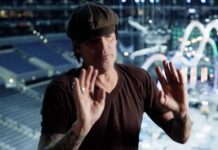During a recent appearance on the “Battleline” podcast, Don Dokken reminisced about Dokken’s involvement in the renowned “Monsters Of Rock” U.S. stadium tour in 1988, featuring prominent bands such as Van Halen , Scorpions, Metallica, and Kingdom Come. Dokken delved into the challenging dynamics within the band during the tour and shared personal insights into the band’s struggles, citing Metallica’s intense performances as a source of inspiration and concern.
Dokken candidly acknowledged the detrimental impact of drug use within the band, revealing distressing incidents during live performances where band members, including renowned guitarist George Lynch, indulged in substance abuse. He expressed disappointment over their inability to maintain professionalism on stage, citing instances where Lynch disappeared during guitar solos due to his involvement in drugs. Dokken lamented the band’s deterioration, attributing it to the prevalent drug use and his own struggle to steer the band in the right direction.
In a separate interview back in April 2021, Lynch elaborated on the strained relationship between him and Dokken, shedding light on a management-induced conflict that had surfaced before the tour’s commencement. Lynch highlighted Dokken’s inclination towards self-interest, leading to discord within the band and the resultant decision to disband. He emphasized the collective effort and commitment the band members had put into their journey, contrasting it with Dokken’s pursuit of individual gain.
Lynch’s emotional turmoil was apparent as he recounted the disillusionment he faced on stage, trying to uphold the band’s image while grappling with the knowledge of Dokken’s potential plans. His struggles with substance abuse were underscored as a coping mechanism during this tumultuous period.
The revelations provided by both Dokken and Lynch shed light on the internal conflicts and challenges that eventually led to the demise of Dokken, marking a significant chapter in the band’s history and rock music culture in the late 1980s.
Yeah, that was a tough tour, because they hadn’t done the ‘Black Album’ yet,” Don Said.”I mean, Metallica’s now the biggest band in the world… And that was kind of maybe the reason we broke up, because of Metallica. Because when we played the stadium tour, Metallicacame on stage every day with this attitude like, you know, do or die. I mean, they just gave it 100 percent, 110 percent. They were kicking ass. They were just coming out with ‘…And Justice For All’, which was not my favorite Metallica album. And they hadn’t done the ‘Black album’ yet that’s now took them into superstardom. And I would talk to the band. I’d say, ‘Look at Metallica.’ And they’re opening for us. And we had the same manager. And I used to say, ‘Well, Cliff[Burnstein], I know they’re opening up and they’re only making half the money as us, but could you put them on after us?’ Because when Metallica went on and they closed the show with whatever it was, ‘Kill ‘Em All’ or something like that, we’re coming on stage doing ‘In My Dreams’, we look like The Monkees practically, ’cause we’re just a straight-ahead rock and roll band. But I respected Metallicaso much because we’d be in Texas and it’d be, like, 105 degrees and they’d go on at, like, 3 o’clock, and it’s just sweltering hot. But they went on every day. Metallicahad this mindset that, ‘If this is our last show, we die. So be it.’ They gave it 110 percent.”
Don continued: “We’d been on the road for a year and a half. And I think we just kind of got full of ourselves. I mean, we had toured with Aerosmith and all these other bands, and we weren’t playing well, in my opinion, because the drugs. When you’re on stage in front of a hundred thousand people, and I’m trying to front the band, and you’ve got all these cameras on you and big screens, and the camera would go to George [Lynch, Dokken guitarist] during a solo, and I’d look over and there’s no George on stage. Where’s George? I hear him playing, but he wasn’t on stage, because he was standing behind his Marshal amplifiers doing coke. And I begged and pleaded and said, ‘Is there any way you guys can’t do drugs for 90 minutes?’ And basically they said no. They were doing coke on stage and it was really, for me, depressing. I started the band, the band’s called Dokken, and everybody was doing coke on stage. And I was, like, ‘Jesus Christ.’ And that’s when the band unraveled.”













